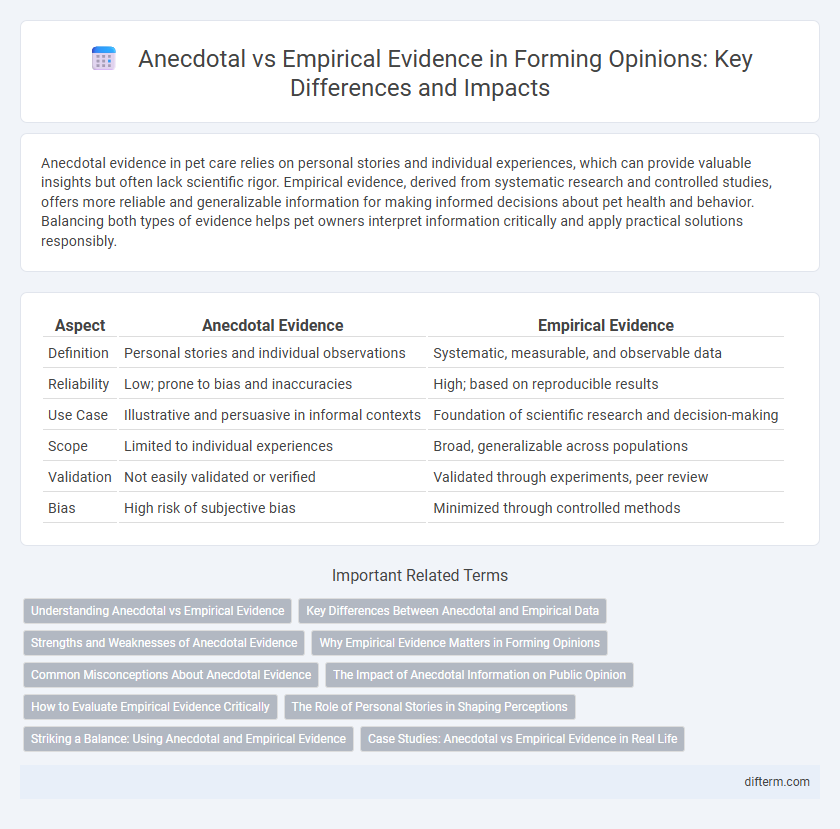Anecdotal evidence in pet care relies on personal stories and individual experiences, which can provide valuable insights but often lack scientific rigor. Empirical evidence, derived from systematic research and controlled studies, offers more reliable and generalizable information for making informed decisions about pet health and behavior. Balancing both types of evidence helps pet owners interpret information critically and apply practical solutions responsibly.
Table of Comparison
| Aspect | Anecdotal Evidence | Empirical Evidence |
|---|---|---|
| Definition | Personal stories and individual observations | Systematic, measurable, and observable data |
| Reliability | Low; prone to bias and inaccuracies | High; based on reproducible results |
| Use Case | Illustrative and persuasive in informal contexts | Foundation of scientific research and decision-making |
| Scope | Limited to individual experiences | Broad, generalizable across populations |
| Validation | Not easily validated or verified | Validated through experiments, peer review |
| Bias | High risk of subjective bias | Minimized through controlled methods |
Understanding Anecdotal vs Empirical Evidence
Anecdotal evidence relies on personal stories and subjective experiences, often lacking rigorous verification and systematic analysis. Empirical evidence, derived from controlled experiments and observable data, provides a more reliable foundation for drawing conclusions. Understanding the distinction between these types of evidence is crucial for evaluating claims critically and making informed decisions.
Key Differences Between Anecdotal and Empirical Data
Anecdotal data comprises personal stories or individual observations, which can be vivid but lack scientific rigor and generalizability. Empirical data relies on systematic collection and analysis of measurable evidence, ensuring accuracy, reliability, and reproducibility. The key differences lie in anecdotal data's subjectivity and limited scope versus empirical data's objectivity and broad applicability.
Strengths and Weaknesses of Anecdotal Evidence
Anecdotal evidence provides compelling personal stories that can make abstract issues relatable and emotionally impactful, enhancing engagement and understanding. However, its lack of verifiability and susceptibility to bias limit its reliability for forming general conclusions or scientific knowledge. While useful for generating hypotheses, anecdotal evidence is weak in establishing causality or representing broader populations accurately.
Why Empirical Evidence Matters in Forming Opinions
Empirical evidence provides a reliable foundation for forming opinions by relying on observable, measurable data rather than isolated anecdotes. Unlike anecdotal information, which can be biased and unrepresentative, empirical data undergo rigorous testing and validation, ensuring greater accuracy and generalizability. This scientific approach minimizes personal biases and enhances the credibility and objectivity of opinions.
Common Misconceptions About Anecdotal Evidence
Anecdotal evidence is often mistakenly regarded as credible proof despite its reliance on personal stories rather than systematic research, leading to subjective bias and lack of generalizability. Empirical evidence, derived from controlled experiments and statistical analysis, provides objective data that withstands rigorous scrutiny and supports reproducible results. Misconceptions arise when individuals overvalue isolated cases, ignoring the necessity for evidence that reflects broad population trends and controlled variables.
The Impact of Anecdotal Information on Public Opinion
Anecdotal information often shapes public opinion by providing relatable and emotionally charged narratives that resonate more deeply than empirical data. These personal stories can disproportionately influence perceptions, sometimes overshadowing statistical evidence and leading to biased or misinformed conclusions. The impact of anecdotal evidence highlights the need for critical media literacy and balanced communication strategies to ensure informed decision-making.
How to Evaluate Empirical Evidence Critically
Evaluating empirical evidence critically requires analyzing the methodology, sample size, and reproducibility of studies to ensure reliability and validity. Scrutinizing sources, data collection techniques, and statistical significance highlights potential biases and limitations often overlooked in anecdotal accounts. Prioritizing peer-reviewed research over isolated observations strengthens informed opinions and supports objective conclusions.
The Role of Personal Stories in Shaping Perceptions
Personal stories wield significant influence in shaping perceptions by providing relatable, vivid examples that empirical data often lacks. Anecdotal evidence resonates emotionally, making complex issues more accessible and memorable to individuals. While empirical research offers broad, statistically validated insights, the role of personal narratives remains crucial in humanizing data and driving public engagement.
Striking a Balance: Using Anecdotal and Empirical Evidence
Striking a balance between anecdotal and empirical evidence enriches the credibility of an opinion by blending personal experience with data-driven insights. Anecdotal evidence offers relatable, vivid examples that capture nuances often missed in quantitative research, while empirical evidence provides statistically validated support that strengthens arguments. Combining these approaches ensures a comprehensive perspective, appealing to both emotional resonance and logical rigor.
Case Studies: Anecdotal vs Empirical Evidence in Real Life
Case studies rooted in anecdotal evidence provide vivid, contextual insights but often lack generalizability due to small sample sizes and subjective narratives. Empirical case studies employ systematic data collection, statistical analysis, and reproducibility, offering robust, evidence-based conclusions applicable across broader populations. Balancing qualitative anecdotes with quantitative empirical data enhances the validity and practical relevance of real-life case study findings.
anecdotal vs empirical Infographic

 difterm.com
difterm.com